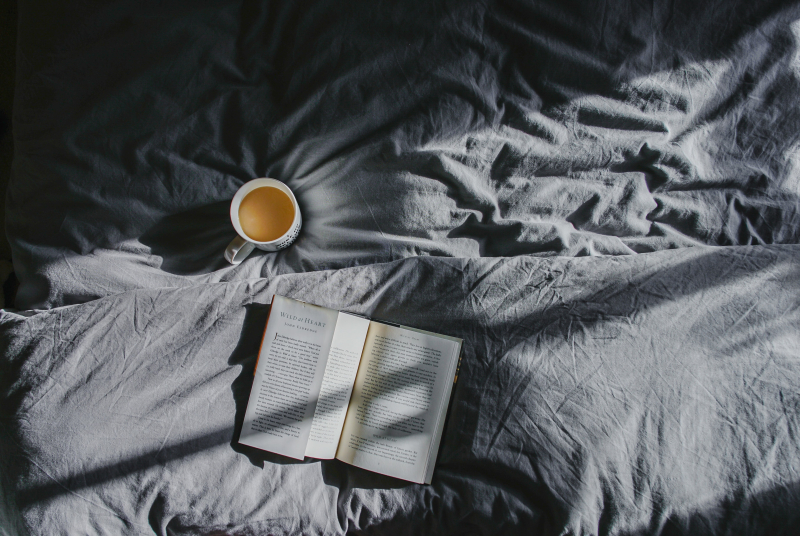The forever-tired problem
This experiment was very much inspired by my pain. In late December, I was precariously close to desperation: I would wake up tired, having snoozed my alarm clock too many times; I would spend the day tired, hoping against hope that it’s not reflected on my performance; then, I would come home and I wouldn’t be able to fall asleep until well into the night. Rinse and repeat. By the end of 2022, I was exhausted from being exhausted; the fatigue became almost a veil separating me from everything I was experiencing – and I knew this had to change.
The sleeping challenge that failed
Before I start listing the ways I’ve tried to restore my sleep schedule, I have to say that I started this experiment after years of failed attempts and one very recent failure. For a brief spell in November, my friend and I decided that we’d do a challenge where we’d go to bed and get up earlier by 15-30 minutes every day. I only lasted about a week and a half, finding myself increasingly disappointed every time I looked at the shared habit tracker we kept. Believe it or not, this story has a happy ending, but more on that later.
So, I reached a point where I was done with all the disappointment. Turning to Google for answers, I discovered a plethora of tips and advice (e.g., here or here). I decided to try some of them, improvised my own, and ranked each by their success rate. Here’s the list I ended up with.

Credit: Toa Heftiba on Unsplash
Fresh air, socks, and room temperature
- Success
One of the most common pieces of advice for better sleep is to let the air in and keep your bedroom cool throughout the night. I found that somehow even the “smell” of fresh air soothed my strained nerves, while the coolness made the blanket feel like a comfortable fort, adding the bit of coziness I needed. A recent post by ITMO’s Staff Support Office also recommended wearing socks to prevent body temperature from going down – which proved to be a great tip. It’s harder to feel agitated when your feet are warm and covered in softness.
Slow breathing techniques
- Mixed reviews
Another piece of advice from ITMO’s Staff Support Office was to take fewer breaths before bedtime to calm the parasympathetic nervous system. I tried a variation of this, practicing the three-part breath I learned from yoga, box breathing, and longer exhales. Pro: it does calm the mind; con: sadly, this doesn’t guarantee better sleep (at least in my case).
Midnight “therapy” sessions
-
Success
The most challenging part of fixing my sleep schedule was actually going to bed and falling asleep. I am okayish with waking up early, but every day I struggle to let go of the tasks from my to-do list that I failed to accomplish. Turns out, if you journal in any form right before bedtime, your anxiety can be put to rest. And when I am too tired to type or write, recording a little “therapy session” as a voice memo on my phone can work wonders, too. I’d describe everything that worried me, without being judgmental or discrediting my feelings. Those recordings are even insightful to listen back to – apparently, you can stumble upon some profound simple truths at night.
Walking before bed
-
Mixed reviews
Not gonna lie, for years I’ve been inspired by the idea of waking up early to go for a walk before my morning yoga session. As I was researching for this article, I saw a few sources recommending the opposite – walking before bed. The idea sounded plausible, so I gave it a go. I couldn’t help feeling like this meme in the process, but all the evening lights and the music in my headphones accounted for quite a blissful half-hour. I complemented it with some yin yoga after I came back home, hoping to achieve the ultimate peace of mind. Fast-forward to sometime later in the night, when I kept tossing and turning. My working hypothesis is that I was overly excited by the whole idea and this worked against me.

I wish I could fall asleep as easily as a cat. Credit: Lauren Kay on Unsplash
Relaxing body scanning meditations
-
Failed
My goal with these was the effect produced by that last shavasana (or corpse pose) at the end of an intense yoga class: you let go of your body completely, it gets heavy, while your mind remains blissfully light. Well, I was mostly successful – each of the 30-minute meditations that I tried left my body relaxed, but my mind was acting strange indeed. Even though gone was the usual tangle of thoughts, I couldn’t exactly “let go” into sleep either. Maybe that’s how experienced meditators tend to spend their nights, but I wasn’t ready to keep my grip on reality 24/7, at least not yet. Granted, maybe I should give it another go with a different meditation or a bedtime story – truth be told, my go-to for the task over the years have been the Harry Potter audiobooks narrated by Stephen Fry.
Daily morning Zoom meditations
-
Success
Getting up has never been so easy: just find a morning buddy who’ll keep you accountable! The very friend who joined me in my first November sleeping challenge became such a buddy for me – for a couple of weeks now, we’ve been meditating at 8 am every morning over a Zoom call. Not only does it help me maintain the same waking-up time, but it has also helped me expand my meditation routine with longer sessions. I think it also helped that we both were working on just one habit here, which is waking up earlier, as each of us had already been meditating daily. I hope we maintain this practice!
The take-home message
The sad truth is, you can’t expect a quick fix when you are dealing with your sleep. But this doesn’t mean you should give up if the bestest tip isn’t working for you. As cheesy as this may sound, try listening to your body and looking closely at your habits. And be patient with yourself. If getting your eight hours of sleep and waking up with the sun is your dream, you will get there, step by step.




